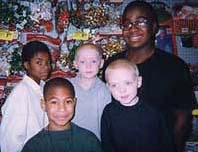 |


|
|
|
|
By Bob Minor
Minor Details
Whether or not our parents would look back and say they were glad they bought into this belief, I wonder how "fulfilled" we really made them. And I am concerned about the burden it puts on most children to live with the idea that they are here to fulfill their parents. Sometimes we wake up and realize that this is a major part of why arrived on this planet. It might happen when we take a different path than our parents expected and we hear, "I didn't bring you up to become . . . ." Was there some unspoken contract we never realized we had agreed to just by appearing in our families?
We know that if an individual does not feel fulfilled in her or his own being, goodness, humanity, and vocation, there is no one else who can do it. And when children live under the impossible burden of fulfilling their parents, they are being pressured to do something they cannot do. Yet, children do get the message, even if it is never spoken out loud. They feel an unnamed burden upon them and are not sure what it is. They become family caretakers, stars, worriers, attention-getting rebels, and surrogate spouses. Family systems therapists see this as the "normal" pattern of families in many cultures, ours especially. And they do not believe that it is healthy for any family member in any way. It's the unusual parent who has worked on her or his emotional image enough to have children for other reasons than self-fulfillment. As l/g/b/t people, the culture has given us many unhealthy reasons to seek fulfillment in parenting. Our self-image has been hurt by homophobia and heterosexism. We have been told we just don't match up to cultural ideals. So, besides the usual unhealthy messages about the fulfillment of parenting that straight people use to parent, we might feel the additional need to live up to this straight standard. The message is: parenting will make us better, like straight people. It will make us feel the fulfillment we don't have because we're not straight. It's not that same-sex couples cannot bring up healthy children. Some studies suggest they do better than heterosexual couples.
The question is, why do we want to be parents? Or, what are children for? They are not here to fulfill us. Don't do it to feel fulfilled. Get counseling instead. It's cheaper and less complicated. The best reason to choose to have children is to nurture life, that is to nurture them, not us. What we get out of it is a benefit. And when they show their own unique, disruptive-of-our-lives personalities, go their own way, look us in the face and disagree, become right wing bigots, give us the sense as teenagers that we are in their way, or take a career path totally against our principles, then we are being tested to see if they were here just to fulfill us. Parents have power over children for good or ill, power to let them grow and ultimately leave to make their own way in the world. But there are so many other influences we can't conceive of now. Nurturing life means saying "Hello," but it also means saying "Goodbye." It's an important, even daunting, task. Parents will make mistakes, and the better ones will admit them to their children. But the greatest mistake would be to become a parent to fill a hole in our own lives. I like the song that says "You can give them your love, but you can't give them your thoughts." I'd add, we better not bring them into the world so they live for us. They need to live their own lives, not ours.  Robert N. Minor, Ph.D. is the author of Scared Straight: Why It's So Hard
to Accept Gay People and Why It's So Hard to Be Human (HumanityWorks!,
2001) and Professor of Religious Studies at the University of Kansas. He
was a member of the Values Panel for the Kansas City Star's nationally
award winning "Raising Kansas City Project" which was concerned with the
values we teach the next generation. He may be reached at Minor@libertypress.net.
Robert N. Minor, Ph.D. is the author of Scared Straight: Why It's So Hard
to Accept Gay People and Why It's So Hard to Be Human (HumanityWorks!,
2001) and Professor of Religious Studies at the University of Kansas. He
was a member of the Values Panel for the Kansas City Star's nationally
award winning "Raising Kansas City Project" which was concerned with the
values we teach the next generation. He may be reached at Minor@libertypress.net.
|

© 1997-2002 BEI
 Human Rights Campaign Executive Director Elizabeth Birch on the cover of Gay Parent magazine
Human Rights Campaign Executive Director Elizabeth Birch on the cover of Gay Parent magazine  The gay foster parents of these children are fighting Florida's gay adoption ban
The gay foster parents of these children are fighting Florida's gay adoption ban